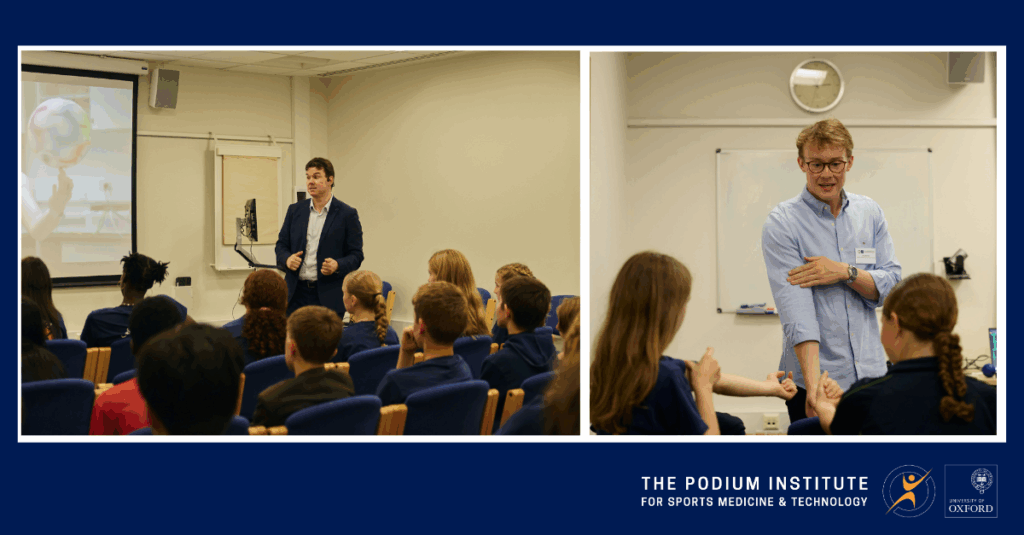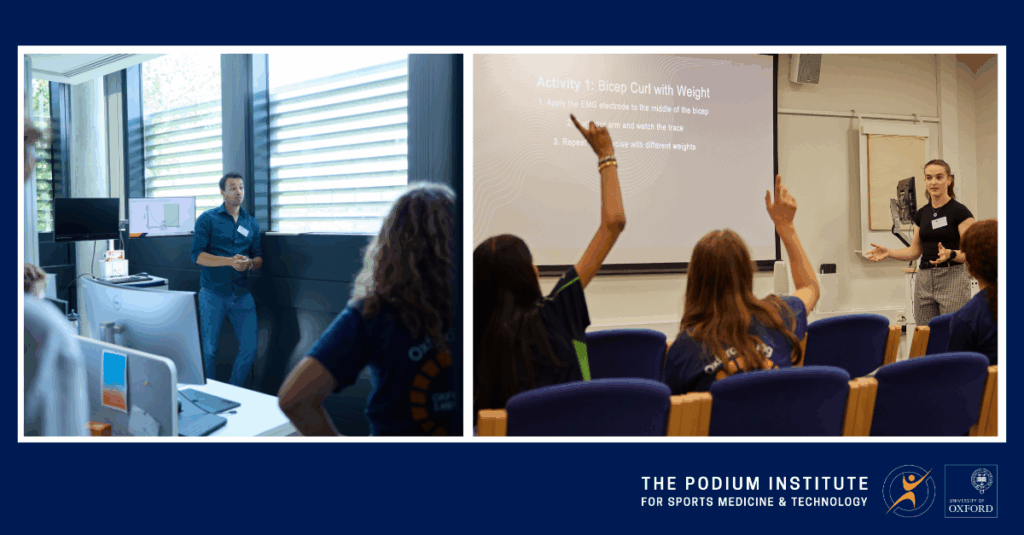On Thursday 12th June, the Podium Institute hosted thirty-seven Year-8 students and their teachers from three Oxford schools for an immersive and thought-provoking afternoon of scientific discovery and hands-on learning. The visit was organised through the Oxford Young Sports Leaders Programme, led by Oliver Cook, a former GB Olympic rower and one of the Programme Managers at the Oxford SDG Impact Lab. The Sports Leaders Programme was set up to explore ways in which sport, education and career development can combine to create opportunities for young people in the city and won the Local Community Engagement Award at the Vice-Chancellor’s Awards 2025. This year The Swan School, Cheney School, and Cherwell School joined existing partners Oxford Spires Academy, The Oxford Academy, and Greyfriars School, marking a significant milestone in the programme’s reach.
After arriving at The Podium Institute, within the Institute of Biomedical Engineering, students were warmly welcomed with an inspiring introduction by Professor Constantin Coussios OBE FREng FMedSci. His words set the tone for a varied programme of practical demonstrations and interactive activities. Students rotated through five demonstration stations, each illustrating the intersection between engineering and health, injury prevention and rehabilitation, giving all participants a rare opportunity to experience first hand the fascinating work being led by the Podium doctoral students and its researchers.
 |
 |
Interactive Demos and Plenty of Curiosity
Highlights of the day included students exploring the exciting potential of soft robotics by trying out a wearable robotic glove, designed to act like a personal physiotherapist. The glove supports physical rehabilitation by guiding movement, adding resistance during training, and enhancing repetitive exercises.
Participants also discovered how EMG sensors track muscle activity to provide insight into injury prevention: using different weights and variations in form, demonstrated how sometimes using the wrong weight (or form) can cause injuries.
In another station, students delved into the science of concussion through quizzes and practical tasks matching concussion symptoms to descriptions, and even trying on a TopSpin helmet, which is a training device focused on strengthening neck muscles for impact, resilience and athletic performance using self-generated centripetal force.
Other demonstrations featured contactless technology capable of detecting subtle changes in breathing and heart rate, using cameras to detect your vital signs offering a glimpse into the future of non-invasive health monitoring.
Meanwhile, at the origami-based helmet station students built paper structures and tested how the designs absorbed shock, learning how these principles can enhance safety in protective gear, as this cutting-edge technology is already being used to develop real sports helmets.
 |
 |
“It was all round the most inspiring and interesting afternoon with excellent workshops — thank you for the coordination it took to pull it all together.“ Oliver Cook
Students and teachers described the day as ‘fun’, and ‘fascinating’, and everyone at Podium took great pride not only in the creativity and hard work that went into preparing the activities, but also in the energy and insight our researchers brought to the experience sparking curiosity, enthusiasm, and thoughtful questions from the young participants!
Podium’s continued support for initiatives like these fosters meaningful community engagement and helps equip the next generation with curiosity, skills, and confidence. It also highlights the vital connection between sports, education, and mentorship, inspiring local youth and strengthening community ties with the city.

Photography: Andrew Bailey
